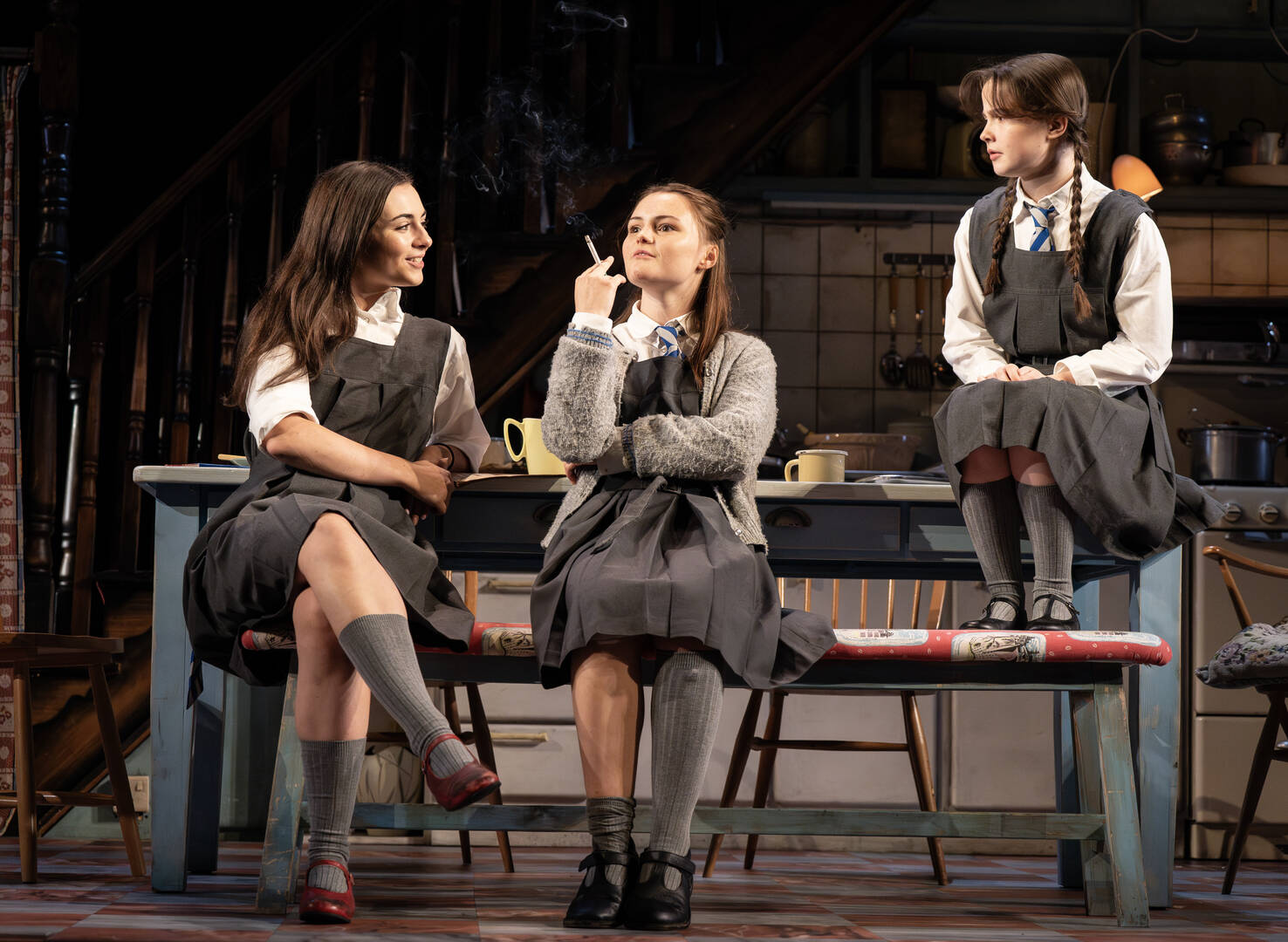“The Song Makes A Space” was the title and thesis of a fascinating speech once given by the late, great musical theater composer Michael Friedman (“Bloody Bloody Andrew Jackson,” “The Fortress of Solitude”). By that he meant something both literal—the “space” being the theater or club or car where we first heard a song and it imprinted on us—and metaphorical, referring to the special musical communion that binds songs to us, and us to each other.
Two new productions on Broadway both create and meditate on this kind of shared imaginative space, and though neither is a musical, both use songs as anchors or frames. “The Hills of California,” the newest epic from Jez Butterworth (“The Ferryman,” “Jerusalem”), follows a would-be singing group of sisters from Blackpool, England, over a few disillusioning decades. And a starry new revival of Thornton Wilder’s indestructible “Our Town” opens with a multi-denominational hymn sing by the entire ensemble; the music that is peppered liberally throughout the show serves a ritual function akin to the ministrations of the show’s ubiquitous Stage Manager (Jim Parsons).
In “The Hills of California,” Veronica Webb (Laura Donnelly), the exacting mother/manager of four teen girls she hopes to turn into the next Andrews Sisters, explicitly echoes Friedman’s formulation, telling them, “A song is a place to be. Somewhere you can live. And in that place, there are no walls. No boundaries. No locks. No keys. You can go anywhere.”
It’s a beautiful sentiment but a terrible guide for living. Not only is a song no guarantee of an actual roof over one’s head; a place without boundaries can be as terrifying as it may be liberating. All the Webb girls learn these lessons to varying degrees as they age into loveless marriages or flinty spinsterhood from the 1950s through the ’70s. But none is schooled as brutally as eldest daughter Joan (played both by Lara McDonnell and Donnelly), who flees to the United States after a harrowing incident of abuse and barely makes it back, years later, to Veronica’s deathbed.
As he proved with his last Broadway success, “The Ferryman,” Butterworth is adept at sprawling, large-cast dramas spiked with bitter comedy. Here he has set himself a high bar: a story that hinges on a single night that changes everything for its characters. In the depiction of that inciting event, at least, he and director Sam Mendes nail it down to the last detail. In 1955, in the kitchen that doubles as the girls’ rehearsal studio, the Webbs perform over-eagerly for an impassive American talent scout (David Wilson Barnes), who in turn gives stage mom Veronica a terrible choice. This perfectly calibrated train wreck of a scene, blazing with nerves, need and terror, is as transfixing and tragic as anything I have seen on stage.

I’m sorry to say that the rest of the play, which traces the build-up to and the aftermath of that fateful night, pales by comparison, as each of the sisters gets their turn to tell the others off. Your mileage may vary, but to me much of “The Hills of California” feels like the kind of awards-magnet drama in which both the writing and acting draw undue attention to themselves.
Wilder’s “Our Town,” meanwhile, is expressly built to draw attention to its theatrical artifices—or rather, I would say, to draw our attention through the manifestly contrived comings and goings in the small town of Grover’s Corners, New Hampshire, all the better to focus on timeless truths about life, death, time and our fragile if not futile human attempts to make meaning. Director Kenny Leon’s new production, performed on a distressed wood set that faintly evokes his last Broadway production, “Purlie Victorious,” has a pop-up storybook tone that fits the material, if a bit snugly and superficially.
Some of the deficits are in the casting, truth be told. Billy Eugene Jones and Michelle Wilson have a lived-in ease as Dr. and Mrs. Gibbs, the groom’s side of the family in the youthful romance that is the show’s filament of plot, as their son George (Ephraim Sykes) woos young Emily Webb (Zoey Deutch). But as the Webbs, Katie Holmes and Richard Thomas bring little more than their familiar faces and affects to their parts.
The production is centered, even more than usual, on its Stage Manager, played by a bearded Parsons as a garrulous, acerbic Mister Rogers. He directs the onstage action, interprets it for us, and stands centerstage to sermonize, bracingly, on the transience of our worldly lives and the “something eternal” we feel in spite of it all.
Indeed it is not just the actor’s name, Parsons, that makes this new “Our Town” feel more like a homily than ever. Leon’s production is cast cross-racially, and costumed in a kind of timeless 20th-century style. This subtly contrasts the entirely white, pre-World War I world described by Wilder with the faces and voices we see onstage, and brings the play inevitably into dialogue with our present moment of deadly division and atomized isolation. Though “Our Town” can be heard as a critique of what the town’s doomed choir director, Simon Stimson (Donald Webber Jr.), calls “the cloud of ignorance” that shrouds our life on earth, what remains most moving about Wilder’s play—and makes it eminently worth returning to 86 years after its premiere—is that it instantiates the very act of noticing and remembering it reminds us we fall short of.
“Do any human beings ever realize life while they live it…every, every minute?” Emily Webb famously implores of the Stage Manager from the uncomfortable omniscience of the afterlife. “No,” he replies, then adds, “The saints and poets, maybe—they do some.”
He might add theatergoers to that list. For a play also makes a space.








